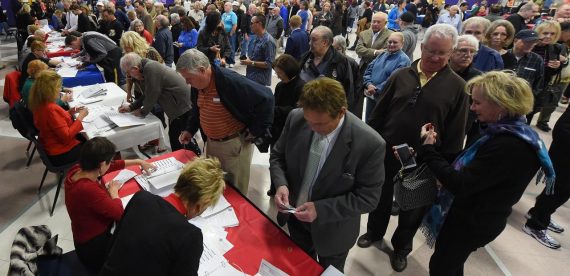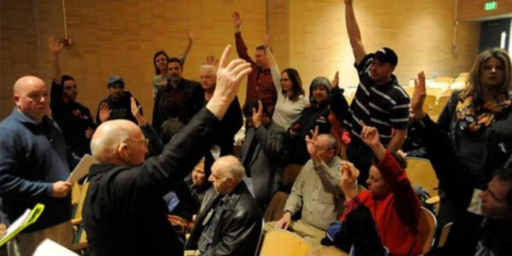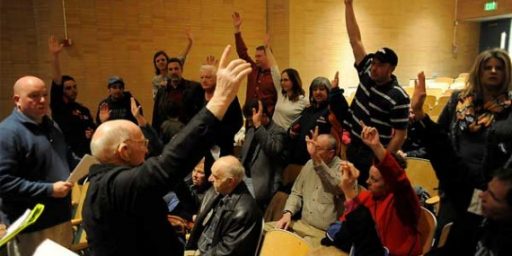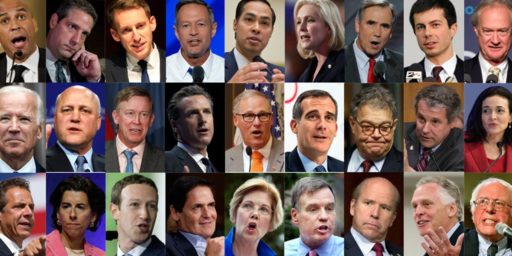Another Chaotic Nevada Caucus Helps Make The Case For Eliminating Caucuses Altogether
This year's Nevada Caucuses are a good argument for why there should not be any more caucuses.
This year marked the third Presidential election in which Nevada held caucuses that drew a wide number of candidates from both sides of the aisle. When the state first set out to authorize the contests after years in which the parties effectively waited until state party conventions to choose the delegates to their respective national conventions, the intention was to give the Silver State a prominent role in the national contest as the “First In The West” contest much like New Hampshire claims status as the “First In The Nation” primary and South Carolina calls itself the “First In The South.” Instead of making Nevada a leading venue for the Presidential campaign, though, we’ve seen nothing but chaos. In 2008, for example, the Democratic caucus was plagued with issues surrounding caucus locations that made it difficult for members of the Culinary Union, under which most casino workers are organized, to participate if they had to work during the time the contest took place. In 2012, it was the Republicans turn for a chaotic caucus thanks to vote counting that took far longer than it should have, especially in Clark County, the state’s most populated county, which took nearly two days to count its ballots.
This year, both parties had problems with their caucuses, largely thanks to larger than expected turnout. During the Democratic Caucuses on Saturday evening, for example, there were numerous reports of caucus locations running out of ballots and registration forms and suggestions that people who weren’t properly registered ended up casting ballots while people who were properly registered faced problems voting because there weren’t enough ballots to accommodate them. Last night’s Republican caucus faced similar problems, similar chaos, similar allegations of improper voting, and similar frustrations:
LAS VEGAS — Long lines. Not enough ballots. Reports of double voting. Tuesday’s Republican caucus in Nevada was plagued with irregularities, after a high turnout overwhelmed the notoriously disorganized system.
At one voting site in Valley High School in Las Vegas, caucus-goers wandered around in confusion, asking each other if anyone worked there.
“They said someone will come. No one has come,” one woman said sadly.
“This is very overwhelming and very disorganized,” her neighbor agreed
The Republican caucus system changed this year, so that voters could show up to sites, cast their ballots and go home. Previously, they were required to listen to speeches and elect delegates before casting their votes. This change only added to the confusion.
“What is the caucus and where is the caucus?” asked Ivan Kovacic, a Ted Cruz supporter who wandered into a near-empty theater in the high school holding his ballot. Kovacic was disappointed that he was expected to vote and just leave.
“Nobody knows nothing, and that’s what’s irritating,” said Carroll Enrich, a Trump supporter who had waited an hour for help finding out which precinct she should cast her ballot in.
“This is the first one I’ve been to, and it’ll probably be the last,” her friend CJ added.
A Republican Party official told Jon Ralston Tuesday night that the party would be “reviewing ballots” after reports of double voting in at least one precinct. The official also added that more ballots were quickly brought to precincts when they ran out.
At Valley High School, the lone party official on site weathered hostile comments and even cursing from audience members once the delegate election process finally began. “I apologize for the process,” said Robin Roberts. “I just got this job yesterday.”
All of this leads Hot Air’s Ed Morrissey to call for an end to caucuses, at least when it comes to the Presidential nomination process:
[C]aucuses are a bad idea. They are a nineteenth-century anachronism, one that should have been retired decades ago in favor of primaries for allocating delegates for presidential nominations.
Even when run reasonably well, caucuses are significantly inferior to primaries. State-run primaries have polls open all day, giving every voter a reasonable chance to cast a vote, and allowing for absentee voting for even broader participation. Caucuses are held at a particular time, which means that anyone who can’t make that meeting time can’t participate in their state’s selection of major-party contenders for the presidency.
The voting process in a primary is far superior. There is more oversight over voter identification and much better privacy protection for the ballots. Ballot counting either takes place electronically or under the supervision of all interested parties, or both. Even better yet, when races run close, primaries allow for effective ballot recounts, whereas caucuses do not.
A few people argued last night that Iowa knows how to run caucuses, and that the big problem in Nevada and other states has been a lack of preparation. While it’s true that Iowa has more expertise, the system itself is still flawed, as we saw in 2012 for Republicans and just three weeks ago for Democrats. In both cases, tight results highlighted irregularities in the counting and reporting processes, leading to weeks of uncertainty. The Des Moines Register called for “a complete audit of the results” from the Democratic caucuses in the wake of numerous irregularities cited by Bernie Sanders’ campaign, specifically in the counting of the ballots — which could not be recounted, thanks to the caucus system.
State-run elections aren’t perfect, either. Believe me, we know that better in Minnesota than most (although we too have a caucus system for the presidential primary). However, there is more oversight, better infrastructure, much broader access, and statutory law governing the election system, while the caucus system falls short in all regards.
Morrissey’s arguments are similar to those that I made four years ago in the wake of both the embarrassment in Nevada and the errors that occurred in Iowa that year that led Iowa Republican Party officials to declare Mitt Romney the winner of the contest only to turn around several weeks later and announce that Rick Santorum had won after all but that vote counting errors on caucus night caused them to make the wrong call. As I noted at the time, caucuses present real problems for a wide variety of people, including those who are ill or home-bound, parents with children, people who are required to work during caucus hours, people who may be traveling at the time of the caucus, and members of the military to participate in what is supposed to be an important process. The most important result of this, of course, is that participation in caucuses is generally far below what one sees in a primary.
One need only look at the numbers to see that this is true.
To take just one example, in 2012, there were 121,052 votes cast in the Republican caucuses in Iowa. Ten months later, Mitt Romney received more than 730,000 votes in the General Election in the same state. In other words, nearly 600,000 potential Republican voter did not participate in the caucuses that year. In Nevada for the same year there were only 32,961 votes cast in the Republican caucus while Romney received 463,567 votes in the General Election. While it’s true that not all of the people who voted Republican in the General Election would have participated in a primary, it seems rather obvious that more of them would have participated than the paltry number the caucuses saw in both these states four years ago. Further evidence for that fact can be seen in the fact that this year’s Republican Caucus in Iowa saw 186,932 people participate, there were 284,120 votes cast in the New Hampshire just a week later, this notwithstanding the fact that Iowa’s population is more than twice as large as New Hampshire’s. Obviously, whether it is intentional or not, it is obvious that caucuses discourage voters from participating in the process by making that participation more difficult, less convenient, and as we saw last night in Nevada, so chaotic that some people may just not bother participating at all. As Ed put it, state-run elections may not be perfect but they are clearly much better at giving people the opportunity to participate than caucuses or any other election process, such as a state party convention. For that reason alone, a primary would seem to be far superior to a caucus, especially when it comes to the process of who the next President of the United States will be.
The main result of the lower participation rate in caucuses, of course, is that it allows well-organized groups that may not represent the majority of voters to have a larger voice in the process than they arguably should. In Iowa, of course, that group consists largely of evangelical voter who, thanks to the ability to organize through churches and other organization, are able to bring large numbers of people to caucus locations and boost candidate who otherwise probably would not have done nearly as well in a more representative contest. Over the years, that has meant that Iowa has given us candidates such as Pat Robertson, Mike Huckabee, and Rick Santorum, none of whom did very well beyond Iowa in the respective years that they ran for the Republican nomination. This year, this fact that Ted Cruz won Iowa but has largely floundered since then is yet another example of how unrepresentative that state is. Similarly, it’s likely the case that Donald Trump would not have won nearly 46% of the vote last night in a primary, which at the very least would have had an impact on the distribution of delegates which is, of course, the number that really matter going forward. Primaries that have higher overall participation rates would make it harder for these well-organized groups to essentially hijack the process and boost candidates who don’t really deserve it.
Beyond participation, caucuses face other problems that argue in favor of eliminating them for both parties. As one writer pointed out, for example, eight years ago the Democratic caucus rules in Iowa violate what many consider one of the most important aspects of voting in modern America, the secret ballot. Additionally, the fact that votes in a caucus are counted by party officials and volunteers, including at least in Nevada people who are openly caucusing for one of the candidates on the ballot, raises serious questions about ballot integrity and the fairness of the counting process. What’s the point of keeping such an archaic system alive?
If the Republican and Democratic parties want to improve the Presidential nomination process, then, they will unite in adopting rules that require all states to select their national convention delegates through state-run and monitored primary elections. Yes, this will end up costing taxpayers money, but it seems to me that having a trustworthy election process is worth that cost.







Many other states manage to run their caucuses without all the problems of Nevada. Perhaps the solution is not to do away with the caucus, but to do away with Nevada.
Or, less flippantly, when a state shows they are incapable of doing their caucus or primary, send them to the back of the schedule for the next cycle with the threat of not seating their delegates. And then, first in the west could be Colorado or Washington.
I caucused in Washington back in 2008. It was an organized mess. I’m with Doug here – the caucus system is hopelessly broken and we need to choose candidates by secret ballot. Short of that, state parties claiming sovereignty over their nomination process need to be regulated so that the voting public can have confidence that the will of the people is followed.
And don’t get me going about super-delegates.
I watches some of the TV coverage inside the caucus last night and it was really sloppy chaos.
Regular secret ballot primaries and vote by mail is the answer.
Caucuses have always been a confused mess. Part of their charm is supposed to be how unprofessional and grassroots they are, but in the age of the smart phone they’re just too easy a target for spinning the poor training and assorted screw-ups as evidence of malice & dirty tricks. That will result in undermining faith in the system, so it would be best to get rid of them, but I’m not sure how given how fiercely the States that have them defend keeping them.
Just sent this wire to the Nevada GOP.
Will send same message to the NVDems as soon as I find their eMail address.
What can I do next to remove this scourge from our political process?
I am still trying to find out who won the wheelbarrow race.
Ed Morrisey and I agree on something, well I’ll be d….
Submitted myself to the torture of the caucus system when living in Minnesota. Fortunately there was a primary later to correct the idiocy that came out of the party conventions.
Death to caucuses.